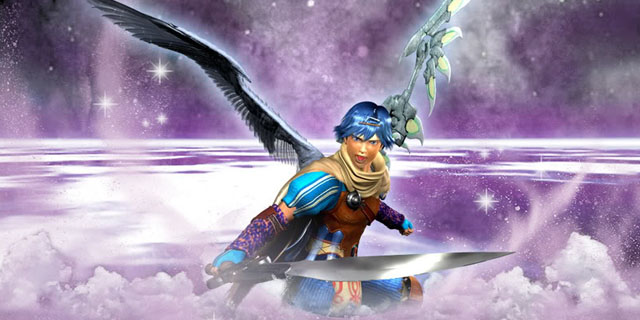
Twists are tricky. They can be the signature moment in a story that will leave an impact for years to come, or they can be predictable, unnecessary and not all that interesting. They’re best used sparingly; utilize too many and you’ll lose the audience’s interest. Go watch the movie Heist and you’ll know what I mean: by the end, a real twist would have been no twist at all. You couldn’t believe anything you saw, because you started to predict that (surprise!) what happened wasn’t actually what happened.
In games, they’re just as tricky to pull off effectively. Since you’re largely in control of the main character, it’s difficult to pull a switcharoo, or have them do something unexpected. BioShock had a great twist; it changed the story dramatically and made total sense in retrospect. Star Wars: Knights of the Old Republic upped the ante with the game’s major twist; upon finding out a secret about yourself, you have to make a crucial decision that will end up deciding which of your teammates stay with you and which ones leave (or die). Call of Duty: Modern Warfare had one of the best point-of-view shots ever seen… even if it has been copied to death.
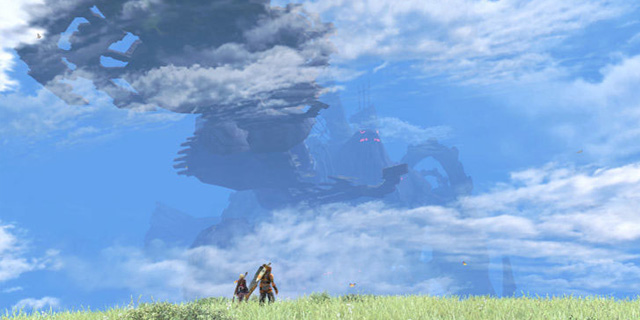
Some games are less successful. Xenoblade‘s plot had so many twists in the last 5-to-10 hours, I couldn’t keep my head on straight. Heavy Rain‘s major twist was largely slammed, but not to the point that it ruined the game. It remains one of my favorite games from this generation of consoles.
A great twist has to make sense. It has to take the audience by surprise, it has to be original and it has to have an impact on the world you’re temporarily living in. For these reasons, my favorite twist in a video game is from the GameCube’s underrated gem, Baten Kaitos: Eternal Wings and the Lost Ocean.
The twist requires some explanation and a ton of spoilers, be forewarned.
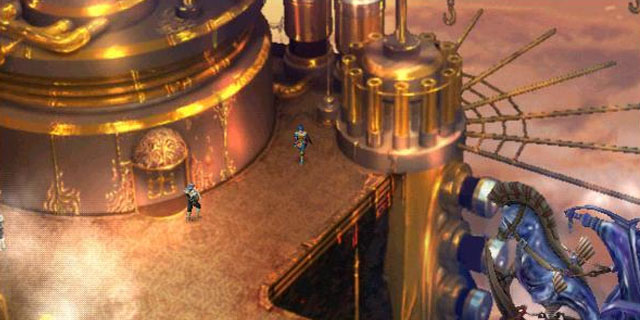
You play the role of a “guardian spirit”, an unseen entity who guides the main character, Kalas, on all decisions and movements. It’s a neat way of giving some credibility to the fact that you’re in direct control of a character. Sometimes the game will break the fourth wall and the characters will talk directly to you (the guardian spirit) directly which can lead to some humorous moments.
Kalas lives on a floating island, one of many in the world. According to the game’s lore, an evil god named Alopecia invaded the world many years ago and sucked the oceans dry, leaving the islands floating in the sky. Malpercio was defeated by five spiritual heroes, who sealed the evil god in the form of five “End Magnus,” cards that can be used for various tasks, such as attacking in battle or storing items.
All the inhabitants in this world have wings. It’s a nice touch; characters have an extra attribute connected to them, and the wing designs themselves are varied and colorful. It makes it easier to remember who is who.
You’re soon swept into the main story by inadvertently releasing the first of the End Magnus with Xelha, a young girl who complies with RPG law by possessing a mysterious pendant. An evil empire seizes the End Magnus, which means it is your job to stop them and prevent them from summoning the power of Malpercio to use it for their own nefarious ways.
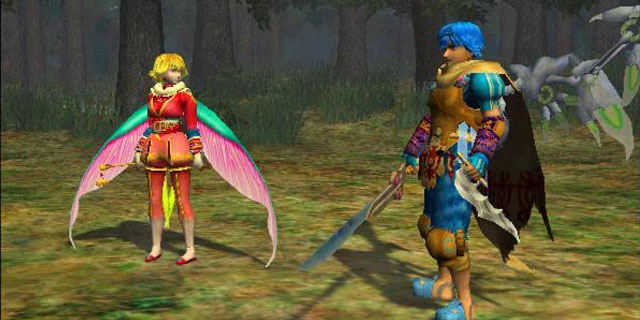
You meet up with some allies along the way. Gibari is a middle-aged fisherman who has seen much of life and is relatively laid-back. He wouldn’t jump into a dangerous situation by choice, preferring to live by his own rules and help people. Lyude is a bit of a wimp to start; he’s an Imperial ambassador and the son of a powerful family tied to the Empire. Savyna is an ex-mercenary, her history shrouded in mystery (is that a good name for a band? History Mystery?)
The last party member to join is Mizuti, a masked… thing who sounds weird, says weird things and wields powerful magic. All party members acknowledge your presence as the guardian spirit. Did I mention you get to name your guardian spirit? Choosing your own name really adds a personal touch.
Not many points for originality so far. You play as a small, underdog team set out to take down the large, evil empire so they don’t revive an ancient god and destroy the world. Ho-hum, you say, and I agree. However, Baten Kaitos has more than a few tricks to keep you interested.
For one, the world is absolutely gorgeous. The GameCube was capable of putting out fantastic looking games (F-Zero GX, Resident Evil 4 and The Wind Waker, among others) and this is one of the best looking… in some areas. Character models aren’t anything to write home about, but some of the pre-rendered backgrounds and cloud effects are absolutely stunning. You want to traverse the various islands and see what else is around the corner. They range from tranquil and serene to bizarre and noisy.
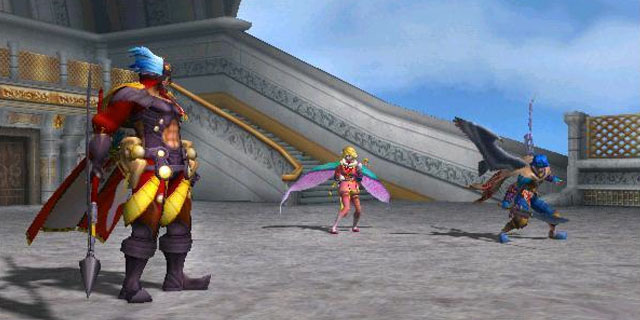
The soundtrack has an equal amount of varied excellence. From the hard rock and metal anthems of boss fights, to the peaceful tunes of small villages, you’ll be listening to these songs over and over and be happy for it. A lot of effort, creativity and talent is here. The less said about the voice acting, however, the better. Mercifully, the voices can be turned off at any time.
So, back to the story. There are rumblings of a traitor in the mix; your last end Magnus has been stolen right before your party decides to take on the Empire. Somebody betrayed the party; you didn’t just misplace one-fifth of Armageddon. But who? Xelha? She seems innocent enough. Gibari doesn’t seem like that kind of person, but would go to great lengths to protect his village. Savyna and Mizuti we don’t know much about either. It’s a whodunit, and I had absolutely no clue. That’s one of several reasons why the reveal made it my favorite twist in a game.
Kalas. Kalas is the one that betrayed the party to the Empire. The protagonist. You. The reasons for this aren’t as interesting as the overall impact, so I won’t go into details. Something about magic influencing his mind. Irrelevant, really. The point is, the main character is now the villain. You.
But wait…not you. That’s why this twist works so well; Kalas was the guilty party, but you, the player, were not Kalas. You were never Kalas. You were his guardian spirit. You “guided” him, but you weren’t him. This would be a cheesy gimmick, save for the fact that it was introduced from the very beginning of the game and committed to it. You aren’t entirely with him in the entirety of the game, and it wasn’t your choice to succumb to the dark side, as it were. You’re the guardian spirit, the audience. You’re just as shocked as the rest of the party. How could he?
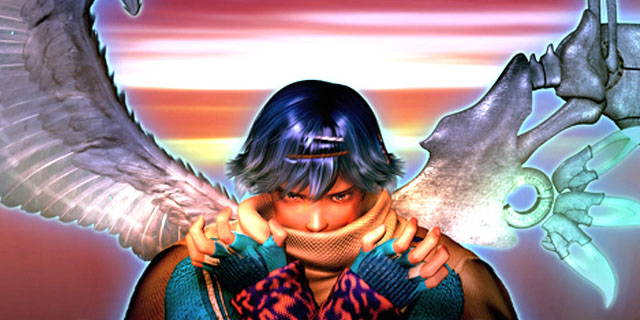
What follows is one of the best moments in the game. The shocking revelation that Kalas isn’t on your side has sunk in and now he won’t let you go. The realization of having to fight Kalas is unsettling; the concept isn’t on the same level as Picard/Borg, but it’s in the same building. He’s angry and wants you dead. So, not only are fighting the toughest opponent in the game so far, you’re doing it without your best fighter. All those powerful Magnus cards you found? Probably equipped on Kalas. Who you no longer have. Shit.
RPG law states that if you fight a party member, or an eventual party member, the fight is way tougher due to inflated stats when you’re fighting against them. It hardly ever makes sense, but it makes the fight that much more intense. Kalas hits you with every kind of devastating attack you can think of. He has loads of HP and unless you’re really leveled up, or get lucky with your cards, it’s going to be a very tough fight.
I like it when games take these kinds of risks. It’s good to shake up the player, particularly in an RPG. If the other characters are fleshed-out and fun to play with, it’s a fun challenge to remove the best fighter. It makes us miss the character in both story and gameplay. It makes their absence that much more painful, and it drives the player to get them back. Indeed, you do get Kalas back, and there’s a good amount of follow-up about him wanting to gain his friends’ trust back.
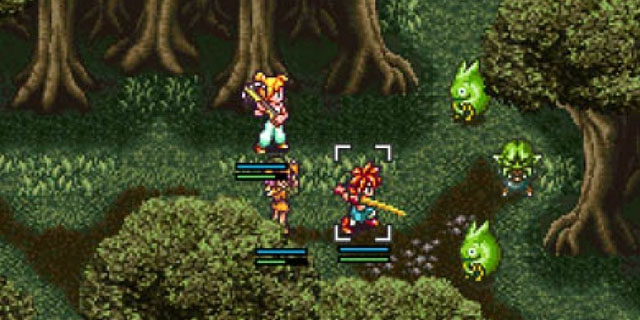
Chrono Trigger employed a similar concept; when Crono was gone, you missed him. The pursuit to get him back resulted in some of the game’s best moments. Baten Kaitos emulates a similar type of feeling; constant dread. My hero is gone. Do we ever get him back? What are the party members feeling? How do they argue amongst themselves?
I loved this twist. It made sense because of the guardian spirit addition. It worked because it was unexpected, it worked because Kalas made for a formidable and unexpected foe. It worked because you wanted to get him back, despite his treachery. It is unsurprising that a majority of Monolith Soft, one of the developers of Baten Kaitos, came from the group that made Chrono Cross. The game is a visual treat at times, and despite a lack of originality surrounding the characters and overall plot, there are enough twists and turns to keep you interested.



















